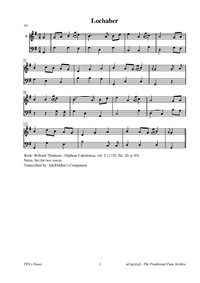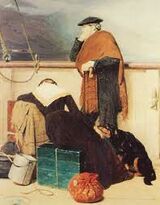Template:Pagina principale/Vetrina: Difference between revisions
No edit summary |
No edit summary |
||
| Line 1: | Line 1: | ||
{{SheetMusic | {{SheetMusic | ||
|f_track= | |f_track=Lochaber No More.mp3 | ||
|f_pdf= | |f_pdf=Lochaber no more.pdf | ||
|f_artwork= | |f_artwork=Lochaber.jpg | ||
|f_tune_name= | |f_tune_name=Lochaber No More | ||
|f_track_title= | |f_track_title=Lochaber No More | ||
|f_section=abc | |f_section=abc | ||
|f_played_by=[https:// | |f_played_by=[https://soundcloud.com/gourdmusic Barry Phillips] | ||
|f_notes= | |f_notes=Lochaber No More. John Watson Nicol, 1801 | ||
|f_caption= | |f_caption=It is on record that, in the old days, the playing of this nostalgic Gaelic air to the Highland regiments on active service abroad had such a profound adverse effect on the morale of the men, that eventually it had to be banned. | ||
|f_source=[https:// | |f_source=[https://soundcloud.com/gourdmusic/lochaber-no-more Soundcloud] | ||
|f_pix=420 | |f_pix=420 | ||
|f_picpix=200 | |f_picpix=200 | ||
|f_article=[[ | |f_article=[[Lochaber No More | '''Lochaber No More''']] | ||
Neil (1991) relates: "It is on record that, in the old days, the playing of this nostalgic Gaelic air to the Highland regiments on active service abroad had such a profound adverse effect on the morale of the men, that eventually it had to be banned." | |||
A pipe setting of the tune appears in the Boys of the Lough book. Another setting was used as a vehicle for words by the Lowland Scots poet Allan Ramsay (b. 1696) entitled "Lochaber No More" ("Farewell to Lochaber, Farewell to My Jean"), a song from the '''Tea Table Miscellany''' (1714) that relates the feelings of a Highland soldier's leave-taking for active service abroad and the sense he will not return. | |||
It is | It is in this spirit that the tune is sometimes heard at funerals, as, for example, when it was movingly played at the 1927 funeral of the great Scots fiddler/composer [[wikipedia:James_Scott_Skinner|James_Scott_Skinner]], by the noted bagpiper and composer G. S. McLennan (who was ill with cancer himself at the time, and who died later the same year). | ||
<blockquote> | |||
<br> | ''Farewell to Lochaber, farewell to my Jean''<br> | ||
<br> | ''Where heartsome wi' her I ha'e many day days been''<br> | ||
''For Lochaber no more, we'll maybe return''<br> | |||
''We'll maybe return to Lochaber no more.''<br> | |||
''These tears that I shed, they are a' for my dear,''<br> | |||
''An' no' for the dangers attending on weir,''<br> | |||
''Tho' bourne on rough seas to a far distant shore,''<br> | |||
''May be return to Lochaber no more.''<br> | |||
</blockquote> | |||
}} | }} | ||
Revision as of 15:06, 20 January 2024

Played by: Barry Phillips
Source: Soundcloud
Image: Lochaber No More. John Watson Nicol, 1801

Neil (1991) relates: "It is on record that, in the old days, the playing of this nostalgic Gaelic air to the Highland regiments on active service abroad had such a profound adverse effect on the morale of the men, that eventually it had to be banned."
A pipe setting of the tune appears in the Boys of the Lough book. Another setting was used as a vehicle for words by the Lowland Scots poet Allan Ramsay (b. 1696) entitled "Lochaber No More" ("Farewell to Lochaber, Farewell to My Jean"), a song from the Tea Table Miscellany (1714) that relates the feelings of a Highland soldier's leave-taking for active service abroad and the sense he will not return.
It is in this spirit that the tune is sometimes heard at funerals, as, for example, when it was movingly played at the 1927 funeral of the great Scots fiddler/composer James_Scott_Skinner, by the noted bagpiper and composer G. S. McLennan (who was ill with cancer himself at the time, and who died later the same year).
Farewell to Lochaber, farewell to my Jean
Where heartsome wi' her I ha'e many day days been
For Lochaber no more, we'll maybe return
We'll maybe return to Lochaber no more.
These tears that I shed, they are a' for my dear,
An' no' for the dangers attending on weir,
Tho' bourne on rough seas to a far distant shore,
May be return to Lochaber no more.
...more at: Lochaber No More - full Score(s) and Annotations
X:0 T:Lochaber M:3/4 L:1/8 R:Air N:Set for two voices B:William Thomson - Orpheus Caledonius, vol. 2 (1733, No. 20, p. 85) Z:AK/Fiddler's Companion K:G V:1 clef=treble name="0." [V:1] G2|GA B2 {Bc}d2|B3A Bd |e2A2 {AB}c2|A4 GA| B2 cB AG|D2G2A2|B2 AG {GA}B2|{A}G4 G A | B2B2 {Bc}d2|(B3A) Bd|e2 A2 {AB}c2|A4 GA| B2 dB AG|D2G2A2|B2 AG {GA}B2|{A}G4|| V:2 K:G clef=bass G,,2|G,2G,2F,2|G,2D,2G,2|C,2C,2A,2|D,4 G,F,| G,2E,2C,2|B,2B,2A,2|G,,2D,2D,2|G,,4 z2| z2z2 G, F,|G,2D,2G,,2|C,4 A,2|(D,2C,2) B,A,| G,,2G,2E,2|B,4 C, C,|D,2D,2D,2|G,,4||
